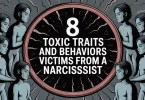In this article, we will talk about the seven things you should never say to a narcissist and why these phrases can backfire. Just to recap what narcissistic personality disorder is, I’m going to write you a summary of the Diagnostic and Statistical Manual of Mental Disorders. I know it’s not the end-all, be-all, but at least it gives us an idea of where to start.
Someone with narcissistic personality disorder has a pervasive pattern meaning it runs through everything of grandiosity, need for admiration, and lack of empathy. This begins in early adulthood and is present in a variety of contexts. The reason I wanted to mention that is because when we have NPD, it doesn’t just happen with one relationship.
It doesn’t mean that we only need admiration or we only think we’re the best when it comes to work or school. This is pervasive throughout our entire lives. We think that we are essentially better and more important than other people, and when that is not reflected in us, we can get nasty, feel very rage-filled, and be very manipulative.
The reason for that is because underneath this facade of narcissism right, puffy chest, “I’m so amazing” is a fragile person. It’s usually born out of trauma. That doesn’t condone their behavior, but it gives you the cause, maybe, of why. It’s born out of this lack of support growing up, and so they put up this fake facade to kind of protect themselves. It’s like an extreme form of pufferfishing, right? It’s a way to keep people away while also looking like we are the best that there ever was.
Now, here are the seven phrases we should never say to a narcissist, starting with number one:
1. “You’re overreacting.”
Narcissists crave validation and acknowledgment. We need all the attention and all the available support. If we undermine or downplay their experience, if we try to dismiss their feelings or call them invalid, it can make them feel incredibly small and unimportant. This can lead to a lot of resentment. Anger and rage are very common responses from a narcissist when you say something like this because, again, remember that fragile sense of self that facade. If we just scratch through it, they feel deeply wounded and can react quickly to protect and almost re-erect the facade.
They might say things like, “How dare you? You don’t understand!” They can lie, manipulate, claim facts that aren’t facts, and try to spin this up to make it look like you’re the one that’s at fault. “How dare you say that? I am correct. My response is warranted.” Essentially, “Get out of here.” That rage response that we can get can put us in more danger, which is why we should never say this to a narcissist even if it’s true.
2. “Why do you treat people like this?”
Whenever we call out a narcissist if we say something like, “You’re a narcissist,” or “Why are you doing this?” or “Why are you lying?” if we call them out on any kind of behavior, again, we’re scratching that facade. They’re going to respond very aggressively.
3. “I don’t know if I’m doing a good job.”
Narcissists love it when we have a vulnerability or an insecurity. They want to capitalize on that. They will remember this if they don’t jump on it right away and add fuel to the fire. Sometimes they can do things like backhanded compliments, where they’re like, “I don’t know why you’re insecure about this. You were way worse at your last job.”
My friend and I used to call those “compliments” where it’s like an insult wrapped in a compliment, and you’re left wondering, “Wait, was that nice?” They will do stuff like that. So, if they don’t jump on it right away, they will log this away for later. Be very cautious if you suspect someone in your life has any of these narcissistic tendencies.
Remember, tendencies do not mean they have narcissistic personality disorder, but we should be aware if we find these people who always think they’re the best, if they don’t always get praise and admiration, they’re shocked by it. They always talk down about everybody else around them. They don’t have any close friends, and they tend to have a lot of fights with anybody close to them, and they always blame them. It’s always their fault.
If we see some of these patterns, we should be very careful about what we share because when we share an insecurity or a vulnerability with them, they will capitalize on that and double down to make us feel worse again, to prove to themselves that they are better than us. That’s why we don’t want to say or share any kind of insecurities with a narcissist.
4. “That’s none of your business.”
I can feel this one already because narcissists hate boundaries. We might not say it this way. I might not say, “That’s none of your business,” because that could be kind of an abrasive way to shut a conversation down or to present a healthy boundary. But I might say something like, “Hey, I don’t want to talk about that right now,” or change the subject, or say, “You know, let’s not get into that.” That might be the way I say it.
Either way, when we lay down a healthy boundary to a narcissist, to them, that feels like a punishment. It feels like we are excluding them from something. Remember, they have this grandiose sense of self. They believe that they’re better than everyone else, that they should have access to whatever they want almost like they’re God-like, they’re a ruler, and they get to decide, and we don’t get to decide.
So, when we show them that we’re making healthy decisions remember, healthy boundaries are the space between which I can love myself and you at the same time they don’t hurt anybody. They protect everybody. But to a narcissist, when they want to manipulate and control, having something in their way is offensive, and they’re going to push back really intensely.
No matter what way we try to set a boundary with a narcissist, they’re going to revolt. They’re going to try to overstep it. Just keep that in mind. Even a request or a boundary is going to piss off a narcissist, and frankly, it’s not worth it.
5. “Why can’t you be more like [insert other people]?”
“Why can’t you be more like my friend’s dad?” or “Why can’t you be more like my friend’s sister?” Insert any other person. Remember, narcissists have extremely fragile egos. I know it looks like they think highly of themselves, and they believe it, but it’s very, very fragile. The smallest little thing can wound them. They are extremely sensitive.
By comparing them to someone else and making them look worse, it’s super triggering, super overwhelming. Narcissists do everything they can to mask deep-seated insecurities with that grandiosity. We kind of joke sometimes where we’re like, “Oh, they’re making up for something.” Like, when someone’s acting full of themselves, that is a narcissist. That’s essentially what they’re doing. They’re making up for the fact that they probably didn’t feel very cared for, very seen, or very safe growing up.
So, to survive that and to move through it, they created this faux sense of self. Unfortunately, for the rest of us who have to encounter this, they didn’t let go of it when it stopped serving them. They continue it even though it ruins their relationships and ends up leaving them usually very isolated and alone.
To compare them to someone else and to even for a second make them think that they’re less than someone else is wounding, and it’s going to get a big reaction. If you don’t get the reaction immediately which I would assume you most likely would they will save that rage for later, or they might put that into more of their effort to manipulate or undermine you. It gives them that icky manipulative quality that causes all their relationships to fail.
So, we don’t want to poke at it. We don’t want to poke the bear because it will come back and cause more chaos than it’s worth. As they say, “The juice isn’t worth the squeeze.” Don’t they say that? “The fruit isn’t worth the squeeze.”
6. “I’m here for you no matter what.”
Now, the reason I bring this one up is you might think, “Okay, that doesn’t make sense. That sounds like the opposite. Shouldn’t we say that to people we care about?” but narcissists need what is called a “steady supply.” Meaning, they need people in their lives usually it’s their partner or whoever they’re with for the moment to do what they want. They need them to always cater to them, pay for things for them, and take care of them in other ways.
If a narcissist is in a relationship with someone who financially allows them to do things, they will never leave them because that’s part of their supply and their need. Because they have this grandiose sense of self, that makes them feel like, “I’m so wealthy and well taken care of. Look at me.”
So, if we tell a narcissist, “I’m here for you no matter what,” then they’re going to use that statement to the fullest extent. Meaning, that they’re going to think this permits them to lie, cheat, emotionally abuse, or control us because we said we’ll be with them no matter what.
And if we don’t if we falter let’s say they lie, and we call them out on it, again, we’re calling them out. That can already cause a reaction. But if we call them out on it, they’re going to use this phrase as a way to bind us to it. Meaning, “You stepped out of line. You said you’d be with me no matter what. So what if I lied? You’re the one that’s lying now because you said that.”
It’s almost like the way that narcissists can twist our words so much that we feel like we’re the ones who did wrong. It can be so disorienting, so disturbing, that we can start to question ourselves. We’re like, “Maybe I did let them down. I mean, I guess that is a lie. I did lie.”
And because we have empathy something that a narcissist does not have we feel bad. We’re like, “You know, I shouldn’t leave him alone or her alone. That is kind of hurtful of me. I should try to repair the relationship. I should apologize.” We do all the things that normal people would do because we feel for others. They don’t feel for you.
I know that’s hard to understand. I can’t even imagine a world where I don’t feel for other people, but they just don’t. They see other people as pawns in their game or things that they might need something from. So, it’s all about using them. It’s not about feeling for the other person or putting yourself in someone else’s shoes emotionally. They just can’t do that. They completely lack emotional empathy.
So, when we consider saying something to them like, “I’m here for you no matter what,” we want to be very careful because they can use that to hurt us later.
7. “I just need you to apologize.”
This one will always cause us to end up being the wounded party. Narcissists are incapable of apologizing. Now, they will pretend. They will be very good at pretending. They will pretend by saying, “I’m so sorry that you feel that way,” or “I’m so sorry if I hurt you,” or “I’m so sorry if that didn’t turn out the way that you wanted.”
There’s a lot of these kind of like pretend apologies where it’s like, “If,” and you’re like, “No, it’s not ‘if.’ I told you my feelings are hurt. I told you that didn’t turn out the way I wanted. I told you showing up two hours late to this dinner was hurtful. It’s not ‘if.'”
So, there’ll be these twists of words that they will use. They might say, “Well, I did apologize,” or “Can’t we just put everything behind us? How come you’re harboring all this resentment?” They’ll try to put it onto you.
So, if we just ask for an apology “All I need from you is just to say sorry” it’s always going to end up with a brick wall, a dead end. It’s never going to go anywhere because, to apologize, just consider for a minute what it takes for us to say sorry. For me to say, “I’m sorry,” to you means that I have to recognize that I’ve done something wrong. I have to acknowledge that what I did caused other people pain. Those are things that a narcissist cannot do.
They don’t have emotional empathy, so they can’t imagine that our feelings are hurt. By asking for an apology which is a completely reasonable thing we’re just going to end up feeling more left, more invalidated, and potentially more abused. That’s why that’s not a phrase I would say to a narcissist because, frankly, it’s kind of a waste of breath.
How to Communicate Effectively with a Narcissist
I know you might be thinking, “Well, crap, then what do I say? How do I talk to those people? What if we have a narcissist as a member of our family?” Don’t worry, I got you. I’ve got some notes.
The ways that we can communicate effectively with someone who is a narcissist or at least has narcissistic tendencies first and foremost, is to use “I” statements. Because narcissists are incredibly sensitive to any perceived slight or blame, it’s best if we keep it to ourselves. If we talk only about how we feel “I feel this way when this happens,” or “I find myself wanting to scream, wanting to run away” if we keep it about ourselves, then it removes a little bit of that potential backlash because we’re hoping to not blame or point the finger.
That’s honestly helpful in all conversations. If we keep it to what we’re doing and how we feel, but if we stop the pointing finger kind of thing, narcissists are less likely to explode. An example would be, “I need some time to myself,” instead of saying, “You’re driving me crazy.” I know that’s an obvious example, but “I” versus “you” just feels different. “I just need some time alone,” versus, “You are too noisy,” feels different.
Second tip: Do your best to stay calm and neutral. You might have to start meditating, breathing, taking baths whatever it takes. The reason for this is because a narcissist, remember, don’t have empathy, so they don’t know how to put themselves in your position. But if you seem very angry, very aggressive, very dysregulated, they’re going to pick up on that, and they’re going to exploit it.
They will say things like, “Look at you getting so agitated. You’re always so angry. Why are you…?” They’re going to point the finger at you and try to blame, blame, blame. “Here you are coming to me telling me that I need to apologize when you’re the one freaking out.”
If we can remain calm and neutral, it will allow the situation to happen without escalating. I would like to say “resolve,” but we all know that’s not always possible. But they will feed off of these emotional reactions, and so it’s in our best interest to not give them any. They might spin out anyway, and they might get really angry on their own, but we just have to stay calm and neutral, use our “I” statements, and move through the conversation to get our point across and end it when we see fit. That will at least diffuse some of it.
My third tip: Set firm boundaries. Yes, they’re going to lash out. We don’t want to have confrontational boundaries what I call them when you’re like, “Stop talking to me that way. If you do, I’m going to leave.” If we’re very confrontational about it, it’s going to get some reaction from them. But if we set firm, clear boundaries, it will give us the space needed to take care of ourselves and prevent them the access to us that could allow for them to love bomb meaning they show us all this affection, “Oh my God, you’re the best,” trying to get us engaged back with them.
It’ll prevent that from happening. It’ll prevent the gaslighting and manipulation that can come along with it. It will allow us to operate in a space where we can exist, and they can exist, and we can both be okay. But yes, they will probably push back on that, but it’s still very important for you.







Leave a Comment